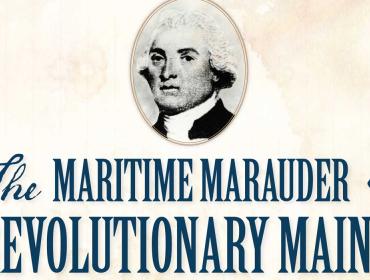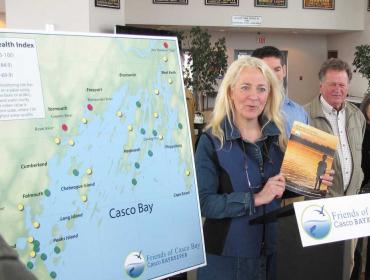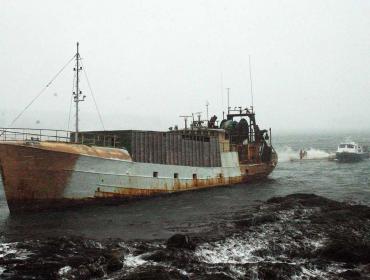Posted November 1, 2019
Last modified November 1, 2019
By Craig Olson
You’ve heard it many times, but it bears repeating: “Change is the only constant.” For Maine’s coastal economy, that statement couldn’t be more appropriate. For those who work on the water or rely on marine-based businesses, shifts in ocean use, diminishing fisheries, and access to steady supplies of both catch and bait have increased the volatility of an industry that has never been easy.
The Island Institute saw the need for fishermen, specifically lobstermen, to have alternative water-based businesses to diversify their income. Ocean-based shellfish and seaweed aquaculture seemed the perfect fit for those already working on the water, and so we started to address these needs when we partnered with Sea Grant on the “Aquaculture and Shared Waters Program” in 2011. In 2016, we opened the first class of our Aquaculture Business Development (ABD) Program.
The focus of the ABD Program is to get participants in the water and their businesses up and running. Now in its fourth year, over 100 individuals have participated in the year-long ABD training. We have found that many lobstermen realize that to continue lobstering and to maintain a life on the water, diversification is a way of balancing out the sharp ups and downs of the industry.
In this year’s class of 29, 72 percent of the participants are lobstermen.
Few people realize that 90 percent of the fish and shellfish eaten in the United States is imported. With a rising global population and the need for protein to feed it, the negative impact of meat production on the environment and its contribution to climate change is growing. Ocean-based aquaculture is a sustainable way to meet more of that need.
Greater access to mussels, oysters, scallops, and kelp not only benefits Maine’s economy, it can help reduce our dependence on imported seafood. Shellfish and seaweed aquaculture, along with fishing, provides a locally sourced form of protein that does not require clearing forested land, applying pesticides and herbicides, or pumping excessive amounts of ground water.
As in any natural system, it’s all about balance.
As any small business person knows, in order to be successful in the long term you need to get along with your neighbors. A linchpin of our ABD training is what we call, quite simply, the “community relations.”
For potential aquaculture lease holders, the most important work they will do is properly siting their lease, which means conducting public meetings and making a concerted effort to reach out to as many local fishermen, community members, and as many nearby landowners as possible to explain their lease, its impacts, and its benefits to the community.
Constructive community dialogue means there will be disagreements. Working through those disagreements makes for a better end product. That end product may be shifting a lease site or limiting harvest hours to certain times of the day.
The current regulatory process is quite extensive, restricting leases in situations where they may interfere with existing uses. If interference is proven, a lease site may not go forward. What is important, though, is that there is a dialogue. That is our charge and part of the regulatory requirements for issuing a lease.
In the months ahead, we will be talking to fishermen and aquaculturists, in many instances the same person, about what it takes to be a marine-livelihood friendly community. This dialogue will reach beyond fishermen, into our coastal communities, and out to major industry groups.
We all want to see Maine’s marine livelihoods thrive, but we can’t do it without understanding concerns in communities up and down the coast of Maine. Oceans are warming; the Gulf of Maine has been warming faster than 99 percent of the world’s oceans. By hauling lobsters while we work alongside ocean-based aquaculturists in industries that benefit us all, we can support both industries in a manner that ensures that the children and grandchildren of fishermen can make their living on the water.
If you have questions about these issues, the lobster and aquaculture industries in general, and/or would like to be part of the conversations the Island Institute will be having along the coast, please contact me, Craig Olson, at the Island Institute at colson@islandinstitute.org or by phone at 207-594-9209, ext. 148.
Craig Olson is a senior community development officer with the Island Institute, publisher of The Working Waterfront.

Contributed by



